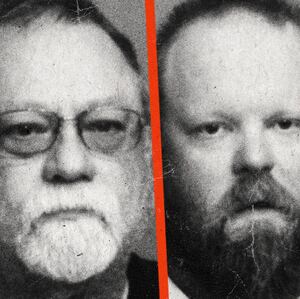A federal judge on Monday rejected a controversial plea agreement that might have allowed the man who murdered Ahmaud Arbery to avoid a hate-crime trial and potentially spend decades of his lengthy prison sentence in a federal penitentiary rather than a state facility.
“Given the unique circumstances of this case and my desire to hear from all concerned regarding sentencing before I pronounce a sentence, I am not comfortable accepting the terms of the plea agreement,” U.S. District Judge Lisa Godbey Wood said on Monday during the plea agreement hearing for Travis McMichael.
Travis McMichael, his father Gregory, and their neighbor, William “Roddie” Bryan, were sentenced to life in prison after all being convicted of of several crimes—including felony murder—in the Feb. 23, 2020 homicide death of Arbery. The 25-year-old Black man’s slaying, captured in a dramatic video by one of the perpetrators, drew national outrage weeks before the police killing of George Floyd set off a wave of protest against racist cops across the country.
ADVERTISEMENT
But just days before the trio were set to face a separate federal hate-crimes trial in connection with Arbery’s death, the Department of Justice announced that both McMichaels—who were sentenced to prison without the possibility of parole for their state crimes—had reached a plea agreement with the government on the federal charges. While the proposed plea agreements filed Sunday evening provided little detail into the contents of the deals, they did state that father and son had requested to be transferred to a federal prison.
During the hearing, Wood heard several of Arbery’s family members bash the prosecution’s plea deal with the McMichaels, insisting that the men deserved to spend the first 30 years of their life sentence in state prison, where they said the conditions are tougher, rather than federal prison. The statements in court mirrored the outage Arbery’s mother expressed prior to the hearing when her lawyer suggested she was “devastated” to hear about the plea agreement and that the decision was a “betrayal” to the family.
“For once, listen to me,” Wanda Cooper-Jones, Arbery’s mother, said in a victim-impact statement in court on Monday. “It is not fair to take away the victory I prayed and fought for. Granting these men their preferred conditions of confinement would give them one last chance to spit in my face after murdering my son.”
In the end, Wood appeared to side with the family in rejecting the younger McMichael’s plea agreement with federal prosecutors because of the 30-year federal prison sentence stipulation in the deal.
Wood’s ruling prompted Gregory McMichael—who had not entered a guilty plea or begun his plea agreement hearing—to ask 48 hours to consult with his legal team. Now, the father and son must decide whether to go along with the plea agreement even in the face of their prison deals being scuttled.
Throughout an almost three-week state trial, prosecutors convinced a jury that Arbery was on a jog through Satilla Shores, a neighborhood in Brunswick, Georgia, when the trio chased him down the street after wrongly suspecting him of burglary. Travis McMichael was caught on video footage filmed by Bryan firing the fatal shots.
But state jurors notably did not hear any arguments from prosecutors about allegations that Travis McMichael called Arbery a “fucking n-----,” as Arbery lay on the ground with several gunshot wounds—nor that McMichael had a Confederate truck decal. On Monday, prosecutors argued that the younger McMichael “associated Black people with criminality for years, and harbored resentment toward African-American people.”
“Travis McMichael did not belong to any hate group and did not set out on Feb. 23, 2020, to carry out an act of violence against an African American person,” prosecutors argued on Monday. “But he made assumptions about Mr. Arbery that he would not have made if Ahmaud Arbery had been white.”
Defense lawyers for the men argued during the trial that their clients were trying to perform a citizen’s arrest on Arbery in connection with suspected break-ins in the area. A jury decided otherwise.







